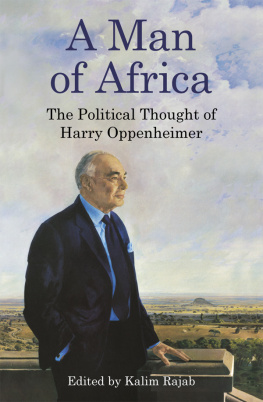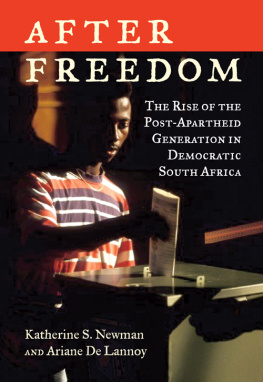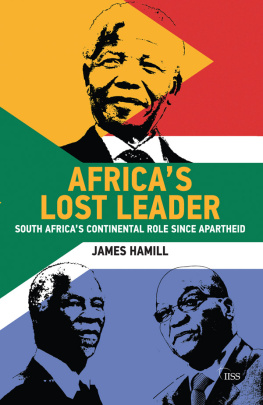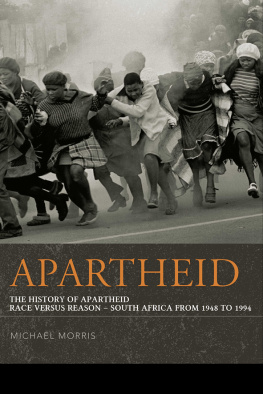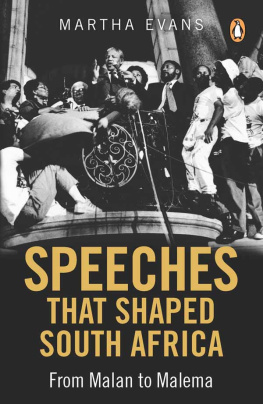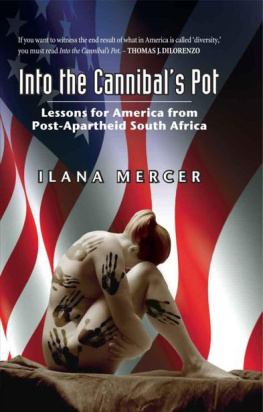Published by Zebra Press
an imprint of Penguin Random House South Africa (Pty) Ltd
Reg. No. 1953/000441/07
The Estuaries No. 4, Oxbow Crescent, Century Avenue, Century City, 7441
PO Box 1144, Cape Town, 8000, South Africa
www.penguinrandomhouse.co.za

First published 2017
Publication Zebra Press 2017
Selection and historical introduction Kalim Rajab 2017
Extracts from speeches estate of Harry Oppenheimer
Contributions individual authors
Cover image Neil Rodger
Author photo Robyn Clark
All rights reserved. No part of this publication may be reproduced, stored in a retrieval system or transmitted, in any form or by any means, electronic, mechanical, photocopying, recording or otherwise, without the prior written permission of the copyright owners.
PUBLISHER: Marlene Fryer
MANAGING EDITOR: Robert Plummer
COPYEDITOR: Dane Wallace
PROOFREADER: Genevieve Adams
COVER AND TEXT DESIGN: Ryan Africa
TYPESETTING: Monique van den Berg
ISBN 978 1 77609 211 6 (print)
ISBN 978 1 77609 212 3 (ePub)
The preamble to our founding constitution speaks of honouring those who suffered for justice and freedom in our country, and respecting those who have worked to build and develop our country. Chief among the latter must stand Harry Oppenheimer and his family; that they also fought in a particular manner for the former sets them apart in the gallery of South African patriots. I shall remember Harry as a man of exquisite grace and charm, a person with a simplicity and directness that was disarming in its spontaneity, and one who was accessible way beyond what was assumed about a person in his position. His support for democratic and philanthropic causes was in my experience always without hesitation and reserve.
His contribution to building a partnership between Big Business and the new democratic government in that period of democratic rule can never be appreciated too much. We join with those millions of our compatriots who mourn with the family and hail a person who was monumentally instrumental in helping this country be the economic leader it is today. We mourn with his family, remember his heritage and look forward to the day that all of South Africa shall share equally in the prosperity he helped create for this country.
Nelson Mandelas tribute to Harry Oppenheimer on his death, 2000
Contents
Abbreviations
ANC: African National Congress
CBM: Consultative Business Movement
NUM: National Union of Mineworkers
UCT: University of Cape Town
UP: United Party
UDF: United Democratic Front
PAC: Pan Africanist Congress
PFP: Progressive Federal Party
SACP: South African Communist Party
TRC: Truth and Reconciliation Commission
Preface
Having been a reader of the distinguished Indian historian Ram Guha, Im grateful for his bringing to my attention in one of his books the maxim of the equally distinguished Cambridge historian F.W. Maitland.
Maitlands maxim called for historians to remember that what is now in the past, was once in the future.
This should be especially heeded by writers of contemporary history, where the desire to pass judgement is often greater. Thus, I have tried to follow this maxim by being, as Guha puts it, driven by curiosity rather than certainty, by the wish to understand rather than the desire to pass judgement.
Similarly, the message I tried to give the contributors to this collection was to interpret what may have been said in, say, 1967 in terms of what was known in that year, rather than by what is known in 2017.
I hope we have collectively succeeded.
KALIM RAJAB
JOHANNESBURG, 2017
Part I
Harry Oppenheimer: A Historical Assessment
A contested legacy
What role can moderates play in a society calling out for revolution? How far should establishment figures be prepared to go in fighting for change? And should such leaders focus be on building and developing a flawed country for future leaders to inherit, or on tearing it down in order to correct its foundations?
This collection examines what is increasingly a contested history in South Africa.
Its focus is on a struggle waged not in the trenches of armed resistance but in the trenches of the boardroom, But others disagreed and disagreed sharply.
There are many realities, writes the Indian novelist Amish Tripathi, there are many versions of what may appear obvious. Whatever appears as an unshakeable truth, its exact opposite may also be true in another context. After all, ones reality is but perception, viewed through various prisms of context.
Context and perception are crucial for evaluating the life and work of Harry Frederick Oppenheimer. A great baron of commerce and worldwide industry in many ways one of the builders of modern South Africa, the continents most sophisticated economy he was also a member of the global business elite from the 1930s to the 1990s, a progressive politician between the end of the Second World War and 1958, and an esteemed political-economy thinker and leader of men for most of his life.
At a time when white men of real power in South Africa were creatures happily dug into their burrows, here was a titan prepared to forge a new path. We have to believe as businessmen, he said in 1982, and by our practice demonstrate that the pursuit of business efficiency and the search for a free, more just society are not contradictory objectives but in fact two aspects of the same thing.
In many ways he seemed to have been a philosopher trapped in a capitalist world. For the person who loomed so large over South African society, and whose group employed hundreds of thousands of men, was instinctively of a retiring, donnish nature, arguably more suited to the cloistered halls of academia than hard-edged commerce and politics; to come across him within the corridors of his power base at Anglo American and De Beers would have been to witness an exercise in reticence and self-effacement. Yet titans do not remain at the top for long without a flinty core. Essentially he was no different. And such was his complicated nature that even while carrying off the exquisite grace of which Mandela spoke, he was ruthlessly able to pursue the most hard-nosed of deals.
Here was a man whose life spanned both white dominance and formalised apartheid. The two overlap, but given South Africas caustic history of racial power relations going back centuries, the former encompasses far more than just the latter. As a riposte to this, he saw himself as a classical liberal committed to individual freedoms and the pursuit of economic justice. If Helen Suzman and Zach de Beer could be called the keepers of the liberal flame during the long, painful decades of apartheid, and the celebrated writer Alan Paton its humanist soul, then Oppenheimer may arguably be called its protector. For him, economic justice took the form of allowing all people the free space to realise their full talents, regardless of race. And at a time when it was highly unfashionable, he never publicly accepted the basis for apartheid, taking active steps to oppose it through the espousal of his particular brand of competitive liberalism.
He also lived during a time when to many in the political and business establishment, both within the country and outside of it, the mass-movement African National Congress (ANC) was seen as a leftist guerrilla organisation seemingly hell-bent on the destruction of the South African state. Despite this, he realised earlier than most the inevitability of having to work with them to bring about change, and so Anglo American was among the first of the multinationals to make tentative approaches to the ANC with the aim of preparing for a new political order. He subsequently worked closely (too closely for many) with the Mandela administration to build a post-apartheid business and government compact a compact that, as we shall see, probably still offers South Africa the best chance of overcoming its deep chasms of race-based inequality.
Next page
